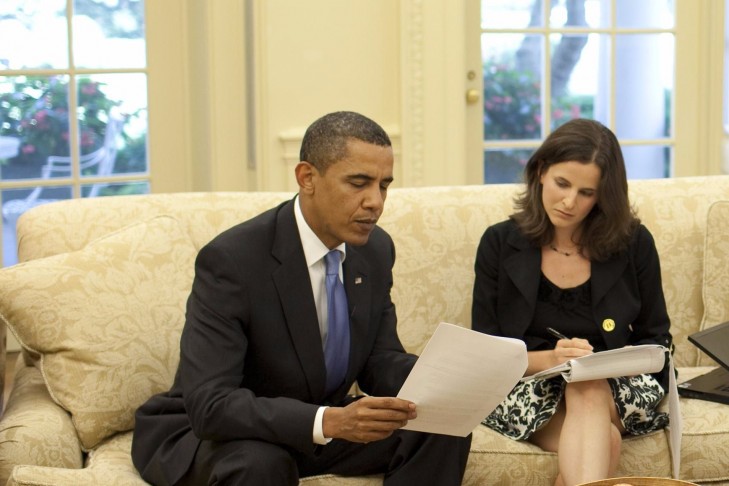At the end of her wonderful memoir, “Here All Along: Finding Meaning, Spirituality, and a Deeper Connection to Life—in Judaism (After Finally Choosing to Look There),” Sarah Hurwitz quotes the Yiddish poet Jacob Glatstein—“Inside me sits the soul of an ancestor who summons me back.” Hurwitz, a Wayland native who served as First Lady Michelle Obama’s speechwriter for six years, recently told JewishBoston: “So many people summoned me back to Judaism—rabbis, teachers and friends, as well as people I met in the course of my journey. They were so excited that I was curious. I also carry the memory of my grandmother, who passed away in 2011. She represented such profound Jewish values. The hundreds of books I’ve read talk to me. [Through these books] I’ve had one-on-one study with Heschel, Buber, Rabbi Nachman of Bratslav and Maimonides.”
In the following interview, Hurwitz talks about finding an accessible and meaningful Judaism through study and individual observance.
In “Here All Along,” you observe that the Torah lends itself to multiple—and often contradictory—interpretations. How did that observation inform and deepen your Jewish journey?
I realized there are so many ways to interpret our texts, and it made me determined to seek out a wide variety of viewpoints. Someone pointed out that the list of rabbis in my acknowledgments at the end of my book included people from the Renewal movement to Orthodoxy. It was a huge range of voices representing different perspectives. I learned that everyone has something to teach me. Everyone sees his or her unique face of the Torah.
Did your Jewish journey influence your day job writing speeches for Michelle Obama?
It definitely did. So many of the values and issues I was writing about were connected to Judaism. Mrs. Obama often talked about children and education, and the way every child is a universe of potential. Every child should have an equal chance to develop that potential. That observation is Mishnah—we all descend from Adam, making us all equal. I recognized my passions and my values—so much of what has driven me—from Jewish texts. When I told Mrs. Obama what I was doing after the White House, she was proud and happy I was pursuing my passion.
You describe the Torah as a “prop” in the synagogue when you were younger. When did the Torah stop being a prop for you?
It stopped being a prop when I gained Jewish literacy. I began to understand key animating ideas. I read the Torah in the historical context in which it was written, and I saw it was a radical departure from the context. Once I had that knowledge, Torah was no longer just scrolls in front of the synagogue; it was this breathtaking, revolutionary, complex, amazing document. It’s the founding document of my people.
What were some of the happy surprises you found in Judaism?
There were no surprises—just beautiful discoveries! I discovered there was an incredibly sophisticated, diverse theology and rich spirituality in Judaism. I also discovered Judaism’s profound ethical wisdom. Reading and studying Jewish law sets a high ethical bar to aspire to. These days I’m much more about things like not gossiping and cheating someone.
What were some of the challenges?
Putting all of my learning together. Many books about Judaism are basic. There are also these wildly sophisticated academic texts, which are exhausting to go through. The research piece of this book was challenging, and creating a structure was the hardest thing I had ever done. I wanted the book to be accessible to everyone who doesn’t know anything about Judaism. It’s mind-boggling how much you need to know to have a basic conversation. Everything in Judaism is hyperlinked to everything else. Where do you start?
When I first started, people would use all this jargon and I had a lot of shame around that. But it’s OK if you don’t know about Shabbat or Yom Kippur. You’re here to learn. Things you don’t know should be a source of motivation, not shame. I wanted my book to be inviting in that way.
You write that the Torah is a political document. How is it political, and how can it help us in these difficult times?
The Torah is essentially a protest against many of the values of the time—hierarchy, abuse of the vulnerable, considering rulers to be God, degradation of human dignity. It’s also a passionate protest against the existing power structures and power dynamic that harm those who are vulnerable. We need to be wary of anyone who takes joy in cruelty. We have to fight with every fiber of our being [those who are] cruel to abuse the weak. Think about Amalek. They attacked the Israelites from behind where children, the elderly and the weak would be. Caring for the weak is so central to Judaism. There is a constant call in Torah to care of the vulnerable. It’s a relevant lesson for today.
The late Rev. Peter Gomes of Harvard Divinity School wrote a wonderful book called “The Good Book: Reading the Bible With Mind and Heart.” I think a lot about that phrase, “reading the Bible with mind and heart.” If we read the Torah with mind and heart, we’ll find a lot of wisdom and guidance on what our obligations as Jews are today.
Sarah Hurwitz will be speaking at Congregation Kehillath Israel on Wednesday, Sept. 11. Find more information here.



